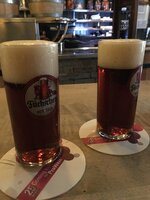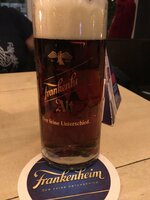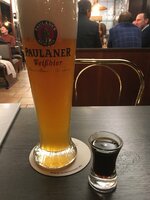I love a good hefeweizen! Franziskaner, Paulaner, and Weihenstephaner are excellent German ones that I can get around here.
As a German national (and beer drinker
However, as a local of the Rhineland - more specifically the area between Cologne and Düsseldorf - I prefer our local beers, of which there are a huge variety, and most of them are at least acceptable, some are good to very good and a few are even excellent. You will have trouble, however, finding them abroad. Very popular with the locals in Düsseldorf are Schlüssel, Uerige and Schumacher whereas Päffgen, Malzmühle and Früh are the favourite beers in Cologne, at least with the natives. Tourists usually drink whatever they get served.









